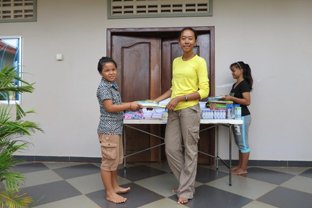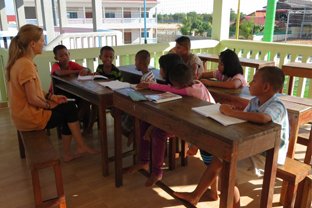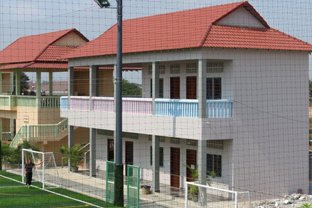CARE AND PROTECTION
Cambodia has a young population. Of more than 13 million people, 41% are children under the age of 18 years. The mostly rural population, 80,5%, of subsistence farmers depends heavily on agriculture. Moreover, 30.14% of Cambodians live below the National Poverty Line and the 18% of households live below the Food Poverty Line. Poverty, food insecurity and HIV/AIDS have resulted in high proportion of vulnerable children and act as a barrier to accessing education for all children. Many vulnerable children do not have the opportunity to complete nine years of basic education. This lack of education sustains the poverty cycle.
Due to a high rate of labor migration, 27% of total population, children are made more vulnerable when they are left behind under the care of elderly grandparents or they follow their families into often unsafe conditions. Older children are more vulnerable to factors such as child labor, trafficking and sexual abuse.
TOGETHER FOR CAMBODIA (TFC), with the Ministry of Social Affairs, Veterans and Youth Rehabilitation (MoSAVY), coordinate the implementation of the basic Standards.
These Standards are a progressive step forwards ensuring that the best possible care is provided to our children, particularly those most vulnerable.
We provide care in six essential areas:
- Food and Nutrition.
- Health.
- Education.
- Social, Emotional and Psychological.
- Economic Strengthening.
- Legal Areas.
THE CHILDREN
The children use every experience and opportunity in their lives to develop their bodies, minds and personalities, as they adapt and grow. Children have the right to have their basic physical needs met. Every child also deserves love, support and guidance as they grow and should be presented with every opportunity to develop into healthy and happy members of society.
The categories of orphans and vulnerable children (OVC):
- Orphans, who are children who have lost one or both parents (maternal, paternal or double parents).
- Children who spend the time living unsupervised on the streets, becoming drug users, with chronically ill caregivers.
- Children with disabilities, including physically or mentally.
- Children abused and exploited, working long hours each day for a petty wage, systematically prevented from going to school, seriously hurt through physical or emotional abuse, victims of sexual abuse (incest, indecent exposure, etc.).
STANDARDS TO IMPLEMENT
The essential areas to provide comply with monitoring and evaluation requirements coordinated by the Provincial Department of Social Affairs.
1- Food and Nutrition:
Every child has the right to food security, access to sufficient, safe and nutrition food and clean water are vital for good health and development. Safe water and nutritious food contribute towards children having a stronger immune system, having the ability to attend school, which increases their chance of reaching their full potential.
In Cambodia one-third of the children are chronically malnourished. The poor nutritional status of Cambodian children is reflected in the high under-five mortality rates. Childhood malnutrition can have long term effects such as reduced cognitive ability.
TFC includes training staff on nutrition inside our Parenting Skills Programme.
2- Health:
Poor hygiene and sanitation, and lack of access to safe water are key contributors to poor health (only 31% of Cambodian households have access to improved sanitation).
TFC supports ensure the children have access to preventive and curative health care. Preventive includes immunizations, Vitamin A, micronutrients supplements, insecticide treated mosquito nets and clean water, clean toilets and encourage hand-washing with soap. TFC implemented training about Hygiene Behaviors, Sexual reproductive Education and Preventing Sexually Transmitted Infections trough the Angkor Hospital for Children. Curative health care includes providing access to health services, TFC access to the Angkor Hospital for Children.
However, getting all children vaccinated in Cambodia remains a challenge, especially for the most vulnerable. Vaccinating children is not a priority for vulnerable communities.
3-Education:
The UN Convention on the Right of the Child recognizes that every child has an equal right to education. TFC has committed to access to education in two of the best centers in Siem Reap, New York International School and Australian Centre for Education. Computer, English as First Foreigner Language, Sports, Traditional Dances, workshops providing non-formal education out-of-school about History, Geography, Spanish as Second Foreigner Language, Sciences, etc. TFC maintains relationship between programmes, school directors and teachers, monitoring attendance and performance at least once per month, increasing the capacity in identifying and removing barriers. TFC promotes the benefits of education in the community, especially for girls, orphans and vulnerable children.
4-Social, Emotional and Psychological:
SEP support is about the way support is provided and how staff interacts with children. SEP involves all our interaction with the children. Our children go through different stages during their development that require different ways of interacting with others. TFC learn about different ways of communicating with children that are related to their age and development needs, and contributing to create a protective environment where children can grow, enjoy their rights and express their opinions freely while their privacy is respected.
All children need opportunities to be social with other children, and support to develop emotionally. Children who have experienced trauma require additional specialized psychological support.
We provide support for the staff to reinforce the success for early identification of problems that might affect care and protection of OVC.
TFC ensures that all information shared by the children is kept confidential, and we let the children know that the information they share is secured. TFC has a policy on photography and visitors contact, because we recognize the impact and negative consequences that OVC might suffer when their confidentiality is not respected. TFC has a written formal Child protection Policy, CPP, especially to don’t feel pressured to comply with demands and request during visits from donors.
5-Economic & Livelihood Strengthening:
TFC provide incomes to families that do not have sufficient economic resources to meet their needs, generating activities trough a vocational training workshop, based on family skills, resource, motivation and demand. Those activities aim to develop household’s women to be self-sustainable. TFC reinforce the women to bring their children to the school and the hospital.
6-Legal Areas:
TFC works with the local authorities to arrange birth registration documents for the children, very important for the legal status of children and sometimes have been lost, destroyed or never done. Without these documents the children may not be able to access basic services such as education.
TFC works providing support to children living with disabilities and to reduce discrimination.
TFC prevents abuse, trafficking and children exploitation.
TFC protects the assets and land titles of the children.


















 English
English Español
Español